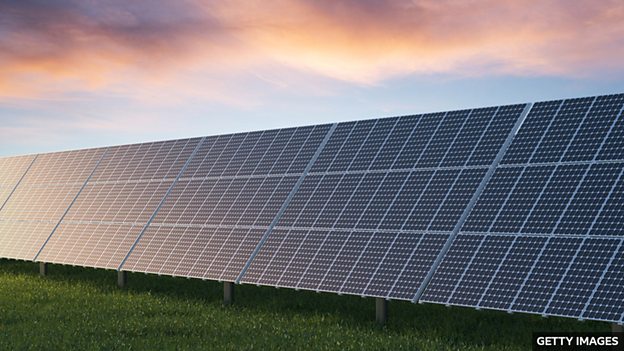媒体英语
New method of extracting silver 科学家找到提取金属银的新方法

英国莱斯特大学的科学家们开发了一种从旧太阳能电池板中回收金属银的新方法。
Both silver and aluminium are typically recovered from solar panels which have reached the end of their useful lives. The metals are then reused. For that though scientists normally use water with sodium chloride, table salt, in it. But the process is toxic and expensive.
银和铝通常都是从报废的太阳能电池板中回收的。然后这些金属被重新利用。为此,科学家通常用含氯化钠(食盐)的水来进行回收,但该过程既有毒又昂贵。
Now, researchers here in Britain have found a way to use iron chloride and aluminium chloride dissolved in brines or solvents to extract the metals instead. The brines are cheap and environmentally friendly, and the process retrieves more than 90 percent of the silver and aluminium in ten minutes.
现在,英国的研究人员找到了一种方法,用溶解在盐水或溶剂里的氯化铁和氯化铝作为替代,从而提取金属。这种盐水溶剂既便宜又环保,而且在十分钟内就能回收90%以上的银和铝。
The researchers are now trying to apply the same approach to other metals from different sources of waste, such as smartphones, thermoelectric materials and magnets.
研究人员目前正试图用同样的方法从不同的废物来源,如智能手机、热电材料和磁铁中提取其它金属。
词汇表
recovered 回收
toxic 有毒的
brines 盐水
solvents 溶剂
retrieves 取回,回收
thermoelectric 热电的
阅读理解:请在读完上文后,回答下列问题。
1. Which metals are typically recovered from solar panels?
2. What are the issues with using water and sodium chloride to extract metals?
3. What are the benefits of using brines as an alternative?
4. How long does it take the brines to extract 90 percent of the silver and aluminium?
答案
1. Which metals are typically recovered from solar panels?
Silver and aluminium are typically recovered.
2. What are the issues with using water and sodium chloride to extract metals?
The process is toxic and expensive.
3. What are the benefits of using brines as an alternative?
Using brines as an alternative is cheap and environmentally friendly.
4. How long does it take the brines to extract more than 90 percent of the silver and aluminium?
It takes ten minutes to recover more than 90 percent of silver and aluminium.



